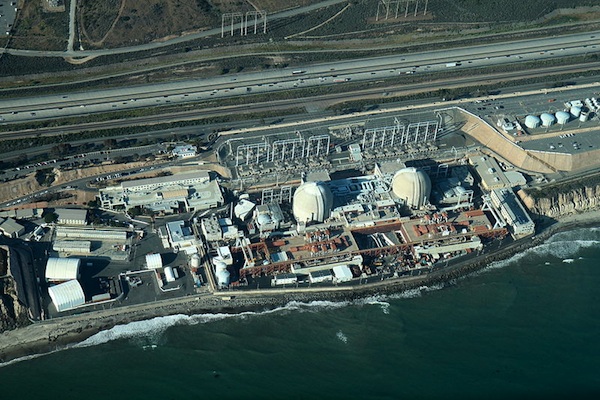
Environmental activists and local citizens breathed a collective sigh of relief on June 7 when Southern California Edison announced it was abandoning efforts to restart the troubled San Onofre nuclear power plant near San Clemente.
Edison’s decision capped more than 16 months of uncertainty following shutdown of the plant at the end of January 2012 after a pipe in the steam generator system leaked small amounts of radioactive water. Subsequent investigation revealed that hundreds of other pipes had unprecedented wear from a pattern of destructive vibrations.
After the shutdown, Edison repeatedly sought to prove that even though the problem was unanticipated there was a sure technical fix that would allow restart without risk. Edison’s case was undercut by multiple disclosures of its running dispute with Mitsubishi Heavy Industries, designer and maker of the steam generators. The two parties could not agree on mutual responsibility for what went wrong or how to share the costs of technology failure.
The case for restart was further undermined by the Fukashima earthquake and seismic sea wave (tsunami) in Japan in 2011 that served as a powerful reminder of the hazard in locating a nuclear plant at tidewater in an earthquake zone. Critics noted that 8.4 million people live within 50 miles of San Onofre at a population density 10 times that of Fukashima, casting doubt on any plans for emergency evacuation.
A close call
Despite a growing sense that restart of this aging and troubled plant was not viable, the outcome was a very close call. Early in 2013 Edison focused on restart of an undamaged unit at 70% power for five months, arguing this would prevent vibrations and give the system an extended test. After review of the plan, a technical team from the Nuclear Regulatory Commission recommended that the agency's commissioners approve the proposed restart – with no further public input.
At that point, the outcome was hanging by a thread. A single vote by the commission would have given the green light for restart. Environmental groups realized this was the crucial moment and put on a full-court press. The Sierra Club’s San Onofre Task Force wrote the NRC that grave questions regarding past performance and untested technology made fast-track approval totally inappropriate, both in terms of environmental risk and the NRC’s public credibility.
We joined other groups including San Clemente Green, Citizens for Nuclear Responsibility, and Residents Organized for a Safe Environment. Our informal coalition spoke in unison regarding the urgent need to resolve restart through a full Adjudicated License Amendment (ALA) process. This quasi-judicial process includes sworn testimony from independent experts and an open forum for public input.
An untested operation deemed 'experiment'
A crucial development was action on May 13 by the U.S. Atomic Safety Licensing Board (ASLB) in response to a petition from Friends of the Earth. The petition focused on the fact that Edison proposed a type of operation never tested before. Under NRC rules, such novelty made restart an “experiment,” which requires a formal license amendment. This key point was the needle in the legal haystack we had all been looking for. The ASLB agreed with the petitioners and recommended to the NRC against any fast-track restart.
On May 15, the Sierra Club wrote the NRC endorsing the Friends of the Earth petition and arguing that even though the Commission could spurn an ASLB decision, to do so in this case would cause deep damage to NRC’s public credibility. In the same time period, Sen. Barbara Boxer (D-Calif.) and U.S. Rep. Ed Markey (D-Massachusetts) urged the commission to consider the growing body of evidence that San Onofre’s steam generator system faced an alarming level of technical uncertainty.
The game was clear: Could citizen groups and elected officials checkmate a staff recommendation and convince the commission to back the Safety Board?
Environmental groups turned up the temperature. At the Sierra Club, we shared our letter to the NRC with all of you on our website. No less than 3,537 Angeles Chapter members and friends wrote their own personal version of this letter and sent it to the NRC – a record level of response for the Angeles Chapter on any issue.
By the same process, another 2,713 personal letters went to the California Public Utilities Commission from Sierra Club members and friends urging the PUC to stop subsidizing Edison with almost $60 million a month in ratepayer dollars – a flow of cash that insulated the utility from making hard decisions about the future of the plant.
Edison pulls the plug
On June 7, Edison threw in the towel. What triggered that decision may never be fully known. The utility’s public statement was certainly true as far as it goes: Carrying the plant in a non-producing condition through further months of uncertainty no longer made economic sense. It is tempting to speculate whether Edison was privately advised by the NRC that the combination of the Friends of the Earth petition and the Safety Board ruling, plus a massive and highly consistent expression of concern from a broad coalition of elected officials, environmental groups and local residents, created a political situation that ruled out approval by the Commission of the NRC staff recommendation for fast-track restart.
Let’s savor the moment in this long and hard-fought struggle. Let’s give ourselves and our partners well-earned praise for dedicated effort and for a strategic sense of what mattered most. And let’s not forget that only three months ago the whole matter seemed hanging by a thread.
The saga of San Onofre, Part I, ended on June 7 with Edison's decision not to seek restart. The Saga of San Onofre, Part II, II began on the same day. Its plot will focus on environmental and financial uncertainties in the decommissioning process. Stay tuned for more actions and news from the Angeles Chapter.
Related content:
Roza Besser
July 2, 2013, 8:09 pm
Leigh Clark
July 2, 2013, 2:31 pm